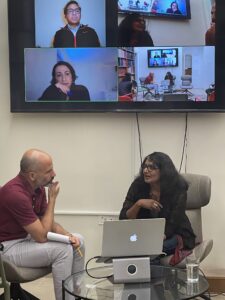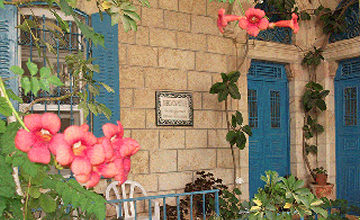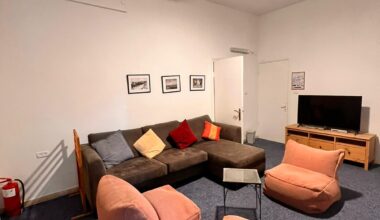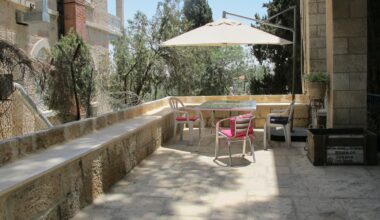As I reflect upon the past year, I am struck by the significant transformations that we have undergone at the Kenyon Institute, in Jerusalem and beyond.
One year ago, the entire world remained in the throes of the Covid-19 global pandemic and the uncertainties and hardships this brought to all spheres of life, including those related to academic research.
Jerusalem remained under strict access restrictions while the city was still reeling from the aftershocks of the events of May 2021 that witnessed local protests escalating into open military conflict for ten days.
The Kenyon Institute, and CBRL more broadly, were also undergoing a series of institutional reforms aimed at creating more centralised coordination between our London, Amman and Jerusalem offices, while upgrading our facilities on the ground. This process would also include preparing policies and programs that rethought the role of our institutions in their local contexts and considered opportunities for developing new means to accomplish our mission of ‘learning from the Levant’.
The exercise was a fruitful one.
The Kenyon Institute’s resources, infrastructure, researchers and networks are now well situated to play a role in transforming our organisation into a more dynamic, capable and engaged academic research hub – both regarding the incubation and production of new research, as well as regarding contributing to public debate and understanding through informed public outreach and education.
We have built upon our historical activities and strengths while expanding into new areas: investing in our archive and library; taking advantage of new technologies to reach broader audiences, and; connecting with new and old partners locally and in the UK to see if synergies of cooperation can be forged or revived.
While Covid-19 has hardly disappeared, and the political situation remains markedly grim – sadly portending deterioration in the coming year – we have nonetheless been able to make significant strides towards our goals in the short period these plans have been allowed to unfold.
Since the opening of the hostel in March 2022 and the return of UK and international academics to the region roughly in the same time frame, the testing of our vision in practice has yielded encouraging results.
The significant infrastructural renovations conducted during lock downs – and which included expanding and improving library workspaces; creating a seminar/meeting room with AV capabilities; establishing a podcast studio and digitization lab; and setting up an archive room and new office spaces – amongst others, all made it possible to envision new possibilities for our activities in scope, depth and means.
They have meant that we are actively engaged in organising, digitising and publishing elements of our archive held at the KI, including the seminal post-1967 activity done to preserve and document Jerusalem’s Islamic architectural heritage.
Dr Yusuf Natsheh’s keynote speech on ‘Evaluating the Documentation and Preservation of Jerusalem’s Islamic Architectural Heritage – A Personal Perspective’
They have meant co-organising a major international conference on “Reassessing the British Mandate of Palestine” with six leading local, UK and North American universities, while putting together a specific panel on the role and legacy of archaeology during this period.
They have meant the launching of a successful lecture series on the centenary year of the British Mandate. This included the organising of four independent webinars on this subject, together with a historical address by Palestinian cartographer and historian Dr. Salman Abu Sitta at the University of Edinburgh, tackling the subject of Lord Alfred Balfour, his ‘Balfour Declaration’ and the broader legacy of British policies in Palestine.
This latter event alone would draw an audience of 150 and generate significant debate about Britain’s colonial past, the University of Edinburgh’s relationship to that past, and broader debates related to the Palestine question and academic freedom. (The recording has quickly become the most viewed webinar on our upgraded webpage and YouTube channel, drawing more than 1400 views in its first week.)
Dr Salman Abu Sitta’s “Address to Balfour” at the University of Edinburgh
Perhaps most meaningful for me personally was the launching of a Kashmir-Palestine Conversations series. This monthly lecture series, launched in October, features presentations and discussions by Kashmir- and Palestine-engaged scholars, chaired by discussants who work in similar disciplinary fields. It aims to draw deeper awareness and understanding within and between these scholarly communities, serving as a basis for long-term network creation, knowledge production and exchange. (The latter project emerged from a British Academy Knowledge Frontiers Seed Grant I was awarded with Emma Brännlund from the University of the West of England (UWE Bristol) in early 2020, but which encountered significant delays because of covid.)

If there is one statistic that illustrates the need for and potential of the Kenyon Institute, it is the fact that in the nine months since our reopening, the KI has racked up more than 1000 nights of occupancy from various fellows and guests.
While surely this figure partially illustrates the backlog of researchers finally getting back to Jerusalem, we believe it also testifies to an expanded awareness of our work and vision. The feedback at least on our modest ‘makeover’ has been supportive.
In this regard, I encourage our members, friends and broader academic periphery in the UK and locally to feel free to open discussion with us on how we might be able to cooperate – individually or institutionally. This is in light of what I observe to be robust interest in the region’s past and present from UK scholars, and the consistent manner this region continues to contribute to world debates and developments – be these political or scholarly.
I wish you a happy new year and look forward to crossing paths with you at some stage in Jerusalem.
Toufic Haddad
9 December 2022, Jerusalem















